#library advocacy
Photo
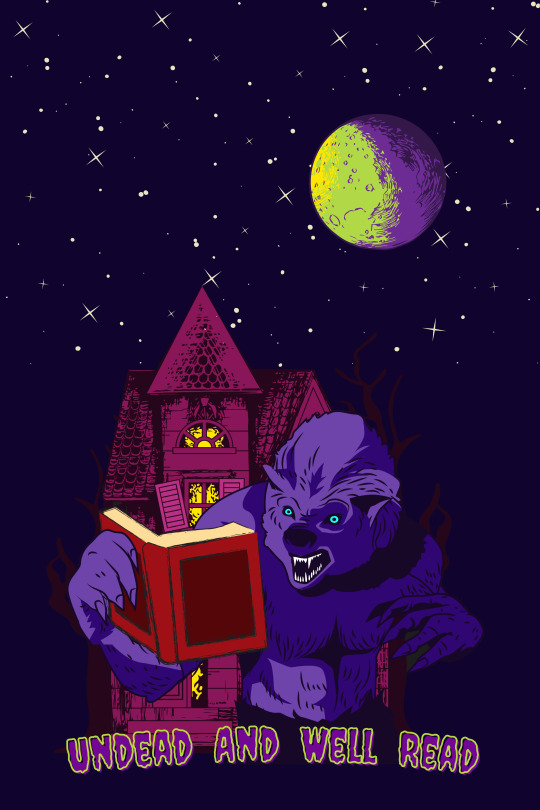

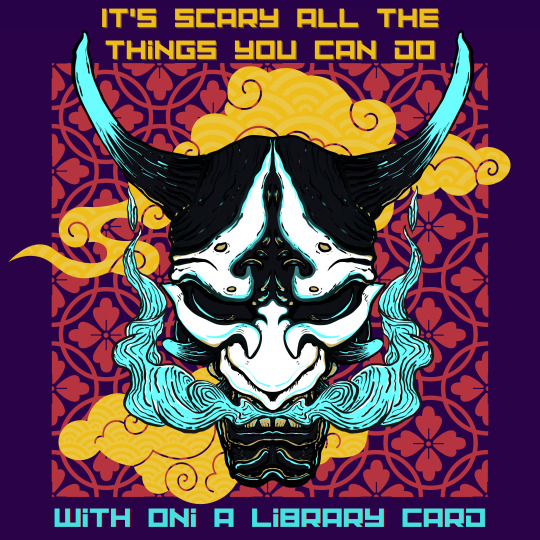
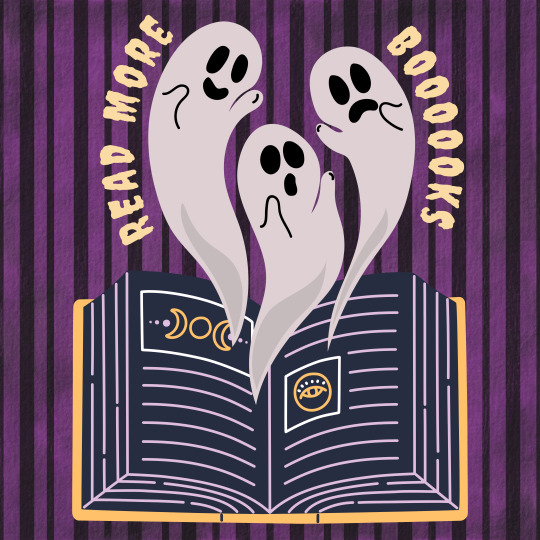


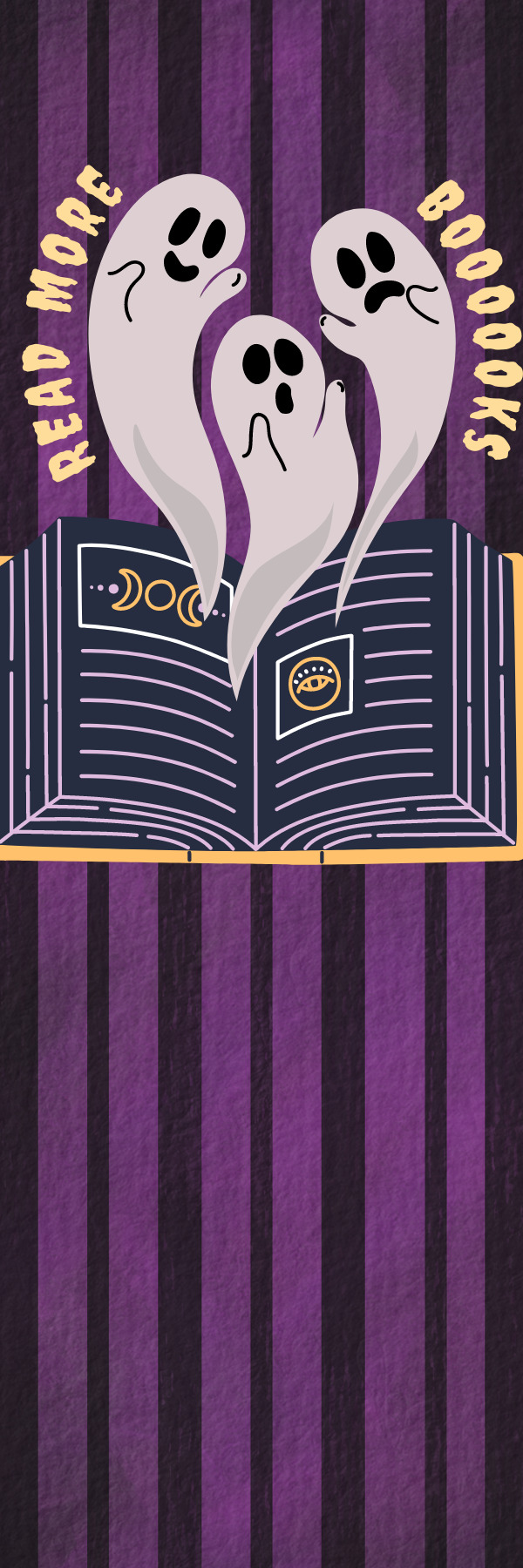
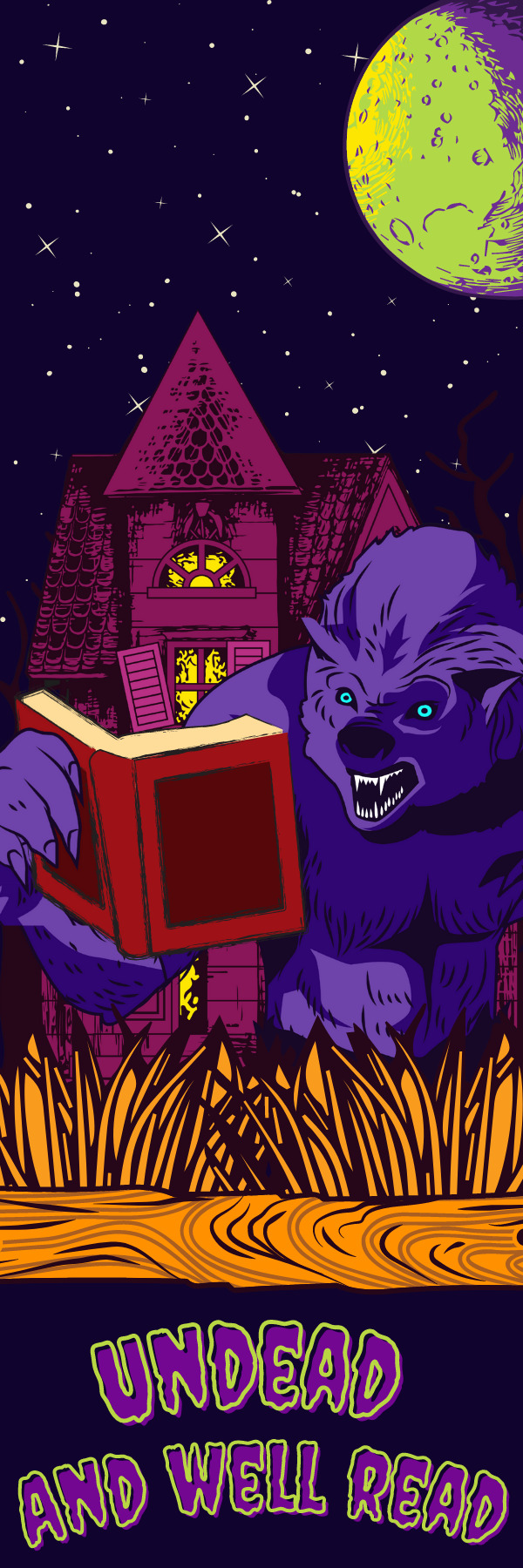
Spooky season is finally here so I put together a few designs celebrating books and libraries. If you like them, feel free to use them! Four poster designs and four bookmark designs! Again, these posters and bookmarks are absolutely free for you to print and use!
School and public libraries are under attack and need your support. Please consider contacting your local representative to ask that these institutions remain funded and protected.
For additional freebies celebrating Banned Books Week, please check out my Tumblr post here.
If you would like to see more of my library/activism designs or would like to get these designs on a T-shirt, book bag, or sticker, you can visit my shop here.
#books#support your local library#book banning#halloween#public library#school library#spooky#freebies#library#libraries#librarians#librarian#library activism#library promotion#library advocacy#spoopy
520 notes
·
View notes
Text

Looking for ways to show the library some love (and hopefully restore our budget)?
Starting today, you can not only sign a support letter online and create a virtual sticky note to support the New York Public Library ... but you can ALSO sign a support letter in-person at your local branch!
And for a limited time, those in-person letters will be rewarded with FREE LIBRARY SWAG. So, stop by to show your library some love, and get something free in return!!!
15 notes
·
View notes
Text
Chicano Librarianship
I discovered this article in the bibliography of another article called, “Diversity in the workplace,” that I was reading on the American Library Association’s website and the reason I chose to read it is because I realized that this was as close to “multiculturalism” as I was going to get. Unfortunately, due to the history of chattel slavery in the United States, issues of diversity can sometimes come down to Black and white (literally), which is why I wanted to ensure I included a text that showed a different perspective.
Though short in length, this article tackled issues of diversity, accessibility, and representation by speaking (from personal experience) about something called, “The Way Out Project,” wherein a federal grant was provided in order to create four Mexican American/Chicano libraries and seven African American libraries.
(Side note, after reading this article I could find little to no information about “The Way Out Project,” the closest I got was a book called Still Struggling for Equality: American Public Library Services with Minorities, published in 2004. This article was written in 2010 and Martinez ends by saying that she wished that more of the people involved had recorded their experiences with the project because it’s like it never existed to begin with. Which in my opinion is another whitewashing of library history.)
Being that it is about the author’s personal experiences, it is inherently less factual and data-driven in nature, however given how little information there seems to be about “The Way Out Project,” this testimony (I feel) is crucial to aspiring information professionals, looking to learn more about the history of public libraries as it pertains to people and communities of color. Martinez writes about how the grants enabled libraries to hire more Black and Chicano librarians as well as restock their collections with materials that these new librarians’ thought were beneficial to their patrons. She says that this was met with heavy opposition, disrespect, and outright disrespect which is unfortunately to be expected, however, what I’d like to call attention to is Martinez’s arguments and observations on how these librarians of color were using their newfound positions of power in order to transform their communities and change the perception of what librarians could and were allowed to be.
By Martinez’s account, these new librarians set out to be socially active—putting forth the idea of the library profession, building, and professionals not relegating themselves to being hoarders of information but agents of local culture and servers of their communities. Which isn’t to say that these librarians didn’t love books or intellectual endeavors; they just seemed to understand the underlying prejudices that were ingrained into the library as an organization and fought against it in order to be more accessible and inclusive. (Although as another side note, it is wild to me that even as they were attempting to make libraries more diverse and accessible to underrepresented communities, Mexican and Chicano librarians and patrons were forbidden from speaking Spanish within the library, which would make the library inaccessible to a number of patrons).
Some quotes to chew on:
“Our project consisted of a group of librarians from varied backgrounds, and we became advocates for the recruitment of Spanish-speaking, Mexican-American, and African-American librarians, as well as the addition of ethnic resources and collections, community-based programs, and ethnic library decor to establish presence and a welcoming environment for the community.”
“During the three years of ‘The Way Out Project,’ we consistently encountered opposition from library employees, were reprimanded for our decisions by administrators, or were ignored by colleagues for our activist librarian ways. The motivations for our decisions, the books we purchased, the programs we developed, and the meetings we attended were routinely scrutinized, questioned, and opposed by the majority of librarians.”
References
Martinez, E. (2010, November 1). Chicano librarianship. American Libraries Magazine, 41(November/December 2010), 40–43. Retrieved May 10, 2024, from https://web-p-ebscohost-com.libaccess.sjlibrary.org/ehost/pdfviewer/pdfviewer?vid=0&sid=bba370c6-536d-438a-a1d8-df92f8fa2d93%40redis.
#information professions#public library#libraries#library advocacy#public libraries#library#chicano#mexican#diversity
2 notes
·
View notes
Text
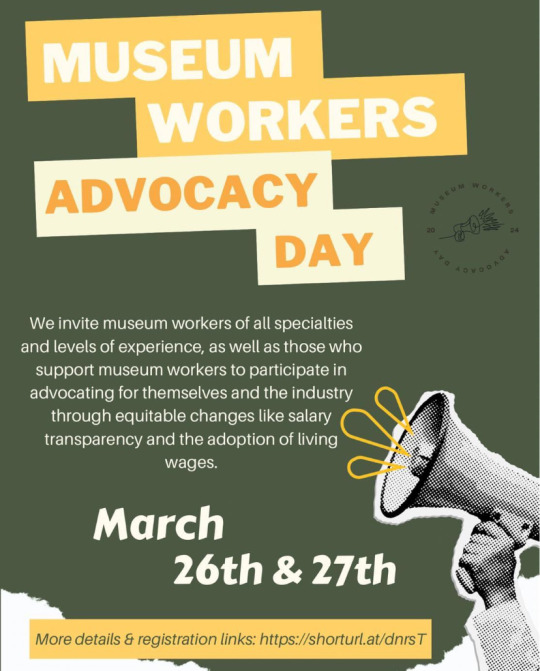
#museums#museum workers#museum work#museum professionals#GLAM#Galleries Libraries Archives Museums#museum worker advocacy#emerging museum professionals
53 notes
·
View notes
Text
if any of my followers learn one thing from me it should be this: if you live in a country with public libraries PLEASE GET A LIBRARY CARD [plain text: please get a library card]!!!! please check out books and movies from them and look into the local programs they have. a lot of them have free classes and/or free food programs and they WANT to help you!!!!!! libraries are wonderful and i encourage you to support them in any way you can, whether that’s donating your money or time or just using their services
#sunspeak#because of fundraising and local advocacy my library system was able to eliminate all late fees!!!! i’m telling you libraries WANT to help-#- you genuinely
116 notes
·
View notes
Text
ive had such a good semester since i transferred, turns out good school/professors/disability department = good grades
#who would have thought#uni#university#online university#library science major#patient advocacy#studyblr#studying#study blog
2 notes
·
View notes
Text
The Freedom to Be Totally Ignorant
The Freedom to Be Totally Ignorant
“I’m not afraid anymore so go for it.” — Jane Elliot
The Oprah episode above aired in 1992. Jane Elliott first did her blue eyes/brown eyes experiment the day after MLK was assassinated. (Note, that transcript contains offensive racial terms.)
(If you’re not familiar, in brief, Jane did a lesson in prejudice with her class of white children by dividing them by eye color. One day the blue eyed…
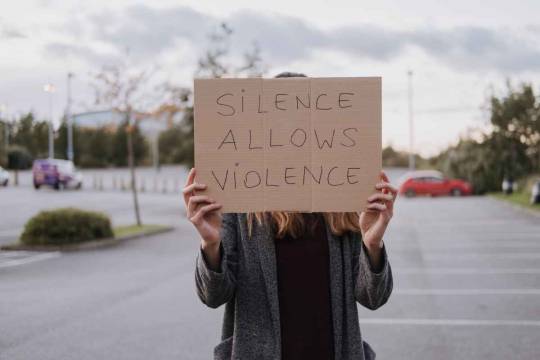
View On WordPress
9 notes
·
View notes
Photo

https://www.eventbrite.com/e/world-bipolar-day-laughter-through-storytelling-tickets-548068968037?utm-campaign=social&utm-content=attendeeshare&utm-medium=discovery&utm-term=listing&utm-source=cp&aff=escb
#pittsburgh#world bipolar day#mental health advocacy#standup comedy#storytelling#top 100 mental health speaker on mental resilience#pennsylvania#Carnegie library#disability pa#disability pride
3 notes
·
View notes
Text

World AIDS Day 2023 at the Carver Branch of the Austin Public Library | Thanks, Everyone!
0 notes
Text
I know this is the Take Personal Responsibility for Systemic Issues website, but I keep seeing weirdly guilt trippy posts about libraries and ebook licenses, which are a labyrinth from hell and not actually something you personally need to feel guilty about. here are a few facts about ebook licenses you may not know:
in Libby/Overdrive, which currently operates in most US public libraries, ebook licenses vary widely in how much they cost and what their terms are. some ebooks get charged per use, some have a set number of uses before the license runs out, and others have a period of time they're good for (usually 1-2 years) with unlimited checkouts during that period before they expire. these terms are set by the publisher and can also vary from book to book (for instance, a publisher might offer two types of licenses for a book, and we might buy one copy of a book with a set number of uses we want to have but know won't move as much, and another copy with a one year unlimited license for a new bestseller we know will be really moving this year.)
you as a patron have NO way of knowing which is which.
ebook licenses are very expensive compared to physical books! on average they run about 60 bucks a pop, where the same physical book would cost us $10-15 and last us five to ten years (or much longer, if it's a hardcover that doesn't get read a lot.)
if your library uses Hoopla instead, those are all pay per use, which is why many libraries cap checkouts at anywhere between 2-10 per month.
however.
this doesn't mean you shouldn't use ebooks. this doesn't mean you should feel guilty about checking things out! we buy ebook licenses for people to use them, because we know that ebook formats are easier for a lot of people (more accessible, more convenient, easier for people with schedules that don't let them get into the library.) these are resources the library buys for you. this is why we exist. you don't need to feel guilty about using them!
things that are responsible for libraries being underfunded and having to stretch their resources:
government priorities and systemic underfunding of social services that don't turn a profit and aren't easily quantified
our society's failure to value learning and pleasure reading for their own sake
predatory ebook licensing models
things that are not responsible for libraries being underfunded:
individual patron behavior
I promise promise promise that your personal library use is not making or breaking your library's budget. your local politicians are doing that. capitalism is doing that. you are fine.
(if you want to help your local library, the number one thing you can do is to advocate for us! talk to your city or county government about how much you like the library. or call or write emails or letters. advocate for us locally. make sure your state reps know how important the library is to you. there are local advocacy groups in pretty much every state pushing for library priorities. or just ask your local librarian. we like to answer questions!
also, if you're in Massachusetts, bill h3239 would make a huge difference in letting us negotiate ebook prices more fairly. tell your rep to vote for it!)
#like. the nypl budget is getting cut bc Adams doesnt think the library matters!#your checking out a book a few times bc you didn't get to it in time is not actually affecting Mr. Cops Not Books#library haint#if you like the library and you like free stuff come use the library. you might be surprised about what we have!#but it's not a moral act either way.#libraries are a public good! i love the library! but so is the post office. we don't moralize about the post office.#ANYWAY.#local librarian with tendencies towards scrupulosity gets frustrated online more news at 10
4K notes
·
View notes
Text
"Next Monday [6/17/24] is the start of National Pollinator Awareness Week, and one Colorado advocacy group is hosting a flower planting drive to rewild Colorado’s meadows, gardens, and just maybe, its children too.
Created by constitutional amendment in 1992, Great Outdoors Colorado (GOCO) is a state-funded independent board that invests a portion of Colorado Lottery proceeds to help preserve and enhance the state’s parks, trails, wildlife, rivers, and open spaces.
This year, GOCO’s offshoot Generation Wild is distributing over 100,000 free packets of wildflower seeds to collection points at museums, Denver Parks and Rec. offices, and libraries all over the state to encourage kids and families to plant the seeds in their backyards.
The Save the Bees! initiative aims to make the state more beautiful, more ecologically diverse, and more friendly to pollinators.
According to a new report from the Colorado Department of Natural Resources, 20% of Colorado’s bumblebees are now at risk of extinction. Even in a small area like a backyard, planting wildflowers can make a positive impact on the local ecosystem and provide native bees with a healthy place to live.
“The Western Bumblebee population has declined in Colorado by 72%, and we’re calling on kids across Colorado to ‘bee’ the change,” said GOCO Executive Director Jackie Miller.
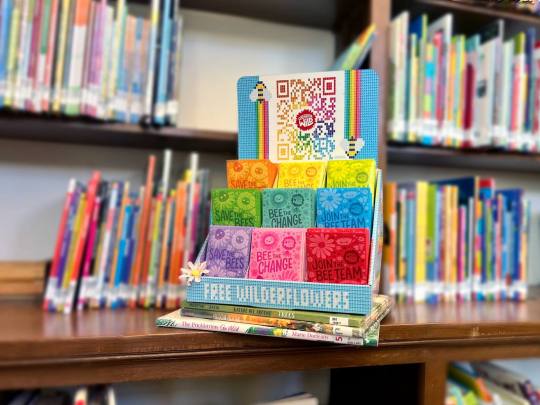
Named after Generation Wild’s official mascot “Wilder,” the Wilderflower Seed Mix was developed in partnership with Applewood Seed Co. and packets are now available for pickup at designated partner sites including more than 80 Little Free Library boxes.
By distributing 100,000 Wilderflower packets, Generation Wild is providing more than 56 million seeds for planting in every nook and cranny of the state. All seeds are regionally-native to Colorado, which is important for sustaining the living landscape of bees, birds, and other animals.
Additionally, by using flower species adapted to the Mile High climate, landscapers and gardeners need to use less water than if they were tending non-native plants.
“Applewood Seed Co. was excited to jump in and help Generation Wild identify a seed mix that is native to the Colorado region and the American West, containing a diversity of flower species to attract and support Colorado’s pollinator populations,” stated Norm Poppe, CEO of Applewood Seed Co. “We hope efforts like this continue to educate the public on pollinator conservation and the need to protect our native bees and butterflies.”
Concluding her statement Miller firmly stated that children grow up better outside, and if you or a parent you know agree with her, all the information on how to participate in Save the Bees! can be found here on their website, including a map showing all the local pickup points for the Wilderflower Seed Packets."
-via Good News Network, June 13, 2024
#wildflowers#wild flowers#colorado#bees#native bees#entomology#insects#save the bees#pollinators#bumblebees#bumble bee#i love bees#biodiversity#native plants#urban gardening#gardening#ecology#conservation#endangered species#wildlife conservation#enviromentalism#good news#hope#hope posting#solarpunk#denver#boulder colorado#colorado springs#libraries#public libraries
428 notes
·
View notes
Text









Adults, kids, and teens! Stop by our library today to sign a letter of support, and get a free gift from NYPL while supplies last.
Remember that if you can't come to the library in person, you can still sign a support letter online and/or create a virtual sticky note to support the library!
#NoCutsToLibraries
#InvestInLibraries
#NoCutsToLibraries#InvestInLibraries#Libraries Are For Everyone#library budgets#library advocacy#Kingsbridge Library#NYPL#nyc
12 notes
·
View notes
Text
The Underrepresented Native American Student: Diversity in Library Science
This is another article I discovered through the American Library Association and their “Diversity in the Workplace” page and it is also very short in length. Despite this, I have no choice but to recommend it to aspiring information professionals because it is one of the only pieces I was able to find in relation to Native Americans and libraries which says a lot about the issues of diversity and representation within the library profession. (Side note: from this article, I did learn the term “tribal libraries.” If you are interested in learning more about Native American libraries and librarianship, it’s likely a good search term to start with).
Something to note about this article however, is that unlike a lot of articles about the state of diversity in libraries, this one is solely focused on the failures of libraries—as a profession, organization, and institution—in addressing and serving the needs of Native Americans, and how their unique community experience sets them apart from other minority/ethnic groups.
Essentially, the author argues that as a direct result of European colonialism, larger percentages of Native Americans are trapped in cycles of poverty that inevitably effect their ability to be eligible to become librarians (that is, being in a cycle of poverty means that they have less access to resources that could help nurture and support academic development) and that the lack of Native American librarians strains the relationship between Native peoples and public libraries.
Tragically, Llyod points out that unlike with other underrepresented groups, few attempts have been made to make libraries culturally relevant to them—although I would like to offer that in recent years, much more effort has been put forth on the part of library organizations and professionals to develop programs, services, and collections that represent the Native/Indigenous community as well as acknowledging that such organizations exist on Native land and continue to benefit from colonialism and white supremacy.
Some quotes to chew on:
“There is a comfort in approaching someone who is of one’s own heritage when seeking services and that includes libraries. When people of color do not see themselves represented in libraries they may not approach the librarians. They may not even approach the library.”
“The library loses relevance for citizens who do not see themselves reflected, who do not perceive their heritage and values recognized and valued or their lifestyle understood by those on the other side of the desk.”
References
Llyod, M. (2007, February). The underrepresented native american student: diversity in library science. Library Student Journal, 2(1).
#information professions#public library#libraries#library#library advocacy#native americans#native american#diversity#librarianship
0 notes
Text
US Harm Reduction Resources
continually updating, not a complete list. feel free to add on any resources you find helpful.
Free Safer Supplies:
Each organization will have different supplies, but generally, harm reduction orgs provide things like syringes, safer snorting + smoking kits, Narcan, condoms, lube, and wound care supplies. Each org has different policies for how to get supplies--some do deliveries, some have drop in centers, some only do one to one needle exchange, some are more flexible.
Next Distro: mail based syringe provider for certain states. Also mails free Narcan.
NASEN: national map of syringe providers
a lot of harm reduction collectives aren't going to have their information listed on big national websites--it's always worth searching "harm reduction in my area" and seeing what's around you. Even if you don't live in a big city, there might be a harm reduction organization in your state that can help you find someone closer to you. there's a lot of rad people doing underground work who want to be there to help you who aren't as easy to find online. If there's street medic collectives, mutual aid groups or groups like Food not Bombs in your area, you can ask people in them who might know where to find harm reduction services in your area!
Drug Users Unions:
Drug users unions are activist groups made for people who use drugs, by people who use drugs! Drug users unions do advocacy work to end criminalization, as well as providing vital community support. Many drug users unions are also inclusive of sex workers and work to decriminalize sex work as well. You can search for "drug users union" in your state.
Urban Survivors Union: National, has resources for creating drug users union
Chosen Few: Drug users union for Black drug users in DC
San Francisco Drug users union
Sex Work Advocacy Groups:
Organizations that do decrim advocacy and provide support for sex workers.
Sex Worker Outreach Project USA- National, has chapters in many states.
Black Sex Worker Collective
Sex Workers Project
How to Use Safely:
Guides, videos, toolkits for safer use!
Harm Reduction Coalition Resource Library
Getting Off Right: A Safety Manual for Injection Drug Users
Safer Crack Smoking
Safer Snorting
Safer Hormone Injection
Levels of Risk: Veins
Wound Care video w/ ASL
How to Use Fentanyl Test Strips
DanceSafe-testing kits, including reagent testing kits!
Erowid-shares experiences people have with different drugs, dosages, what things to expect
Bluelight- another forum for discussing experiences with drugs.
Drug Interactions Checker
Sex Work Resources:
Tricks of the Trade by L. Synn Stern: tips for street based sex work
A Quick and Dirty Sex Worker Safety Toolkit
Girls Do What they Have to Do To Survive by YWEP
Dis/Organizing: How We Build Collectives Beyond Institutions
by Rachel Kuo & Lorelei Lee
Tryst Blog
Hotlines:
Never Use Alone: 877-696-1996. Overdose Prevention Hotline--Volunteers stay on the phone with you while you use and call emergency services if you overdose.
HIPS Hotline-1 (800) 676-4477. Emotional support for drug users and sex workers. Does not work with cops.
feel free to add on more resources. love + lube <3
1K notes
·
View notes
Photo


Just a reminder that it is Banned Books Week this week (Sept 18th-24th)!
Although the list of books I’ve read contains many that are also on some Banned Book lists, I still want to read at least one challenged book this week. So this week, I will be reading “Dear Martin”, by Nic Stone – a book that is on multiple banned book lists across the country (reasons cited include “violence, police brutality, and swearing”)
What books will you be cracking open this week?
For more info about Banned Books Week, check out the ALA’s website:
https://www.ala.org/advocacy/bbooks
Side note: The shirt I’m wearing in that photo is actually one of my own designs from my Etsy shop ( https://themainelyartsygeek.etsy.com ) – I have thist design available on t-shirts, stickers, tote bags, etc <3
#banned books week#banned books#books#books & libraries#activism#advocacy#reading#teachers#dear martin#nic stone
1 note
·
View note
Text
my major is multidisciplinary so it has several different concentrations and i want to add gerontology with a focus on patient advocacy so my whole degree would be Library Science and Gerontology - Patient Advocacy And A Spanish Minor. yes it would take me longer to graduate but im already beind my peers and im also online so who cares not me
0 notes